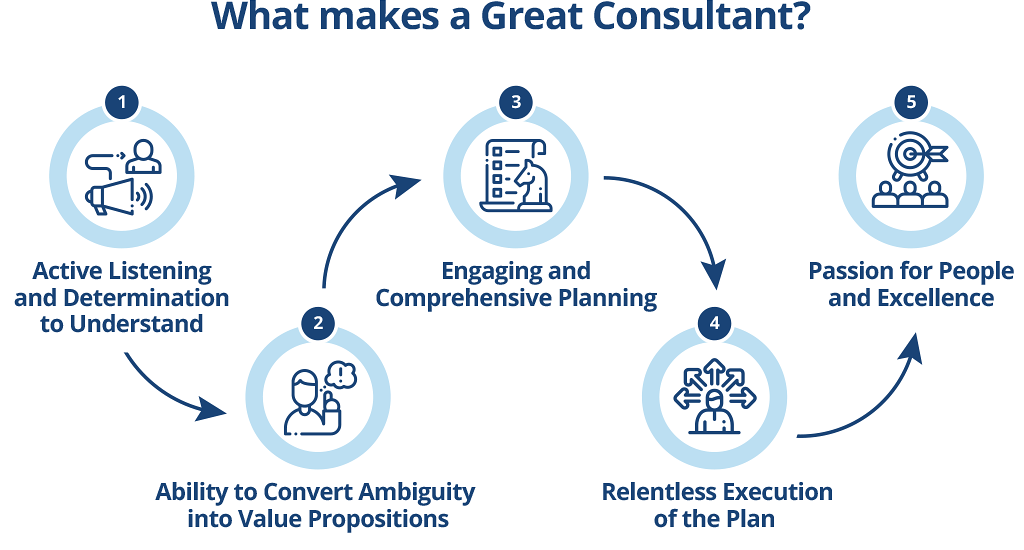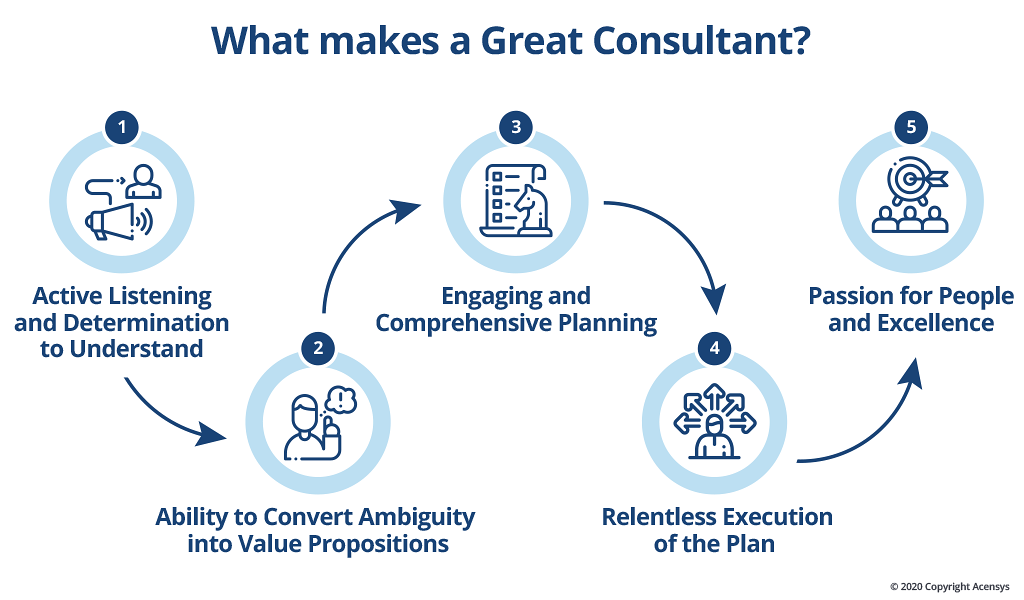- May 17, 2020
- Posted by: Bruce Leebove
- Category: Consulting


What makes a Great Consultant?
To stay in business over the long run, a consultant must be good at what he/she does. To borrow the words of one of our key Clients: (a) a contractor gets paid to do a piece of work; (b) a good consultant can deliver a work package with more complexity and take on some extended accountability; (c) a Great Consultant leads and takes on high degrees of accountability, is self-driven and solves problems. There is a time and place for (a) and (b) but being a Great Consultant can be equated to being an artist. To distinguish oneself as unique and exceptional, to get the best rates and deliver the most value to your customers, there are five recurring themes I have encountered among the best of the best:
(1) Active Listening and True Understanding
(2) Ability and Courage to Convert Ambiguity into Value Propositions
(3) Ability to Plan the Work in an Engaging Way
(4) Relentless Working of the Plan
(5) Passion for Excellence and for all Stakeholders
(1) Active Listening and True Understanding
A Great Consultant recognises that active listening and real understanding are key to engaging with clients in a way that will yield remarkable results. It’s not enough to simply listen and nod your head while you furiously take notes. Even if you have perfect recall (or record all your sessions to emulate perfect recall), you only reach an understanding when you engage your Client proactively. Empathy is important, putting yourself in your Clients’ shoes to understand their pain points, their needs, and their motivations. If you understand why your Client sets out on a course, you’ll give better advice on how to navigate the journey and identify when to change tack. You also need to actively reflect to your Client what you are hearing in your own words, so they hear your perception. This alone will often bring out clarifications and latent requirements your Client hadn’t thought of; especially when you also pepper in your unique perspectives. Active listening is useful, even critical throughout an entire engagement and beyond.
This empathetic and active listening approach is a key part of Design Thinking. Whether you use active listening techniques or full-on Design Thinking, a Great Consultant must still do much more with the information acquired.
(2) Ability and Courage to Convert Ambiguity into Value Propositions
When I was on the Client side of the equation, I was appalled by how often expensive consultants would listen to what I had to say and ask me what I wanted and simply try to deliver against the things I requested. If a Client knew exactly what she wanted, she’d be out there executing against it or at the very least, putting something to tender rather than paying for your services to help her.
A lot of people are uncomfortable with ambiguity and yet this is where Great Consultants thrive.
We live in a time where disruption is an everyday occurrence. Most businesses are constantly transforming to stay afloat. A Great Consultant listens and then constantly looks for ways to help Clients deliver more value into his/her organisation. Sometimes as a consultant, a client gives you a narrow scope; but even then, it’s critical to provide thought leadership at every touch point.
Clients don’t always know what they want. Great Consultants constantly look for new and unexpected ways to deliver value even within their limited scope. It’s also important to show your Client you are thinking “big picture”. Even if your Client has no appetite to go beyond the scope, continuing to share and consider context will help you identify and help the deliver more value into her business.
A lot of us live in a mindset of scarcity but in my view, Great Consultants are generous with their ideas. Great Consultants are always looking to tie together vague and ambiguous ideas with solid proposals that will work. They also cultivate and prioritise the value-added ideas identify and filter ideas that may waste time.
(3) Ability to Plan the Work in an Engaging Way
John Foley was the former lead solo pilot of the American flying squad the Blue Angels (johnfoleyinc.com/john-foley). One of the most important rituals of the Blue Angels was the pre-flight brief. They visualised and went into detail every step of their manoeuvres and of course mistakes there are deadly. Great Consultants apply the same idea to their work. Once they have a mission laid out, they go into planning phase. Great Consultants go into detail and visualise as much as they can about how their approach and how they will deliver it. Great Consultants understand two competing aspects of planning:
-
- too much granularity and tracking can bog down a project and a team
- not enough granularity will lead to crisis and war rooms
Great Consultants find the balance though they often err on the side of granularity (a vague plan leads to vague results). The plans of Great Consultants typically include identification and mitigation strategies for all known risks and on-going issues so they can avoid crisis mode. Great Consultants generate plans and business cases that are engaging and create and drive imperatives at all levels. They understand that if key stakeholders do not feel there is an imperative, consciously or unconsciously, they will work against the goals of the project. Great Consultants plan the work and can articulate the approach at multiple levels with various levels of abstraction. They empathise with and understand diverse types of stakeholders:
-
- working level team members typically want to know their tasks and what’s expected of them
- mid-level stakeholders can be the most challenging, they want to know everything is under-control and be engaged to help solve risks before they impact quality, timelines or costs;
- executives want to know how much it will cost and what will they get and by when and to trust the process
A Great Consultant does the planning and articulates her plan reliably and on an on-going basis to the right people, at the right time and with the right context.
(4) Relentless Working of the Plan
Great Consultants maintain their plans on at least a weekly basis and quite often, daily. They actively maintain a single version of the truth (and this is getting easier and easier in the Digital Age with PPM Tools like Workfront, Asana or ServiceNow just to name a few).
Good Consultants have a plan with durations and assignments and then keep an eye on it and try to stay with it when it makes sense. Great Consultants have a plan with working dependencies, tracked issues and risks and effort assigned to major tasks. They actively maintain and work the plan and every time something causes a delay (or might cause a delay), they update their plan accordingly. This is not rocket science or an art form, the distinction is the level of energy and focus that goes into it.
Good Consultants get busy and find themselves unable to keep up with the Plan. Good Consultants often lose time absorbed in solving problems themselves although they have assigned a team member to that topic. A Great Consultant recognises when he needs help, adjusts the plan, can show the impact of a topic and therefore able to justify obtaining the required help (be it from an existing team member or someone outside). A Great Consultant knows that every team member is also a project manager in charge of his / her own tasks (again, this made easier in the digital world). A Great Consultant isn’t afraid of the truth because she has supported the truth with a working plan with working assumptions and proactively managed issues and risks. A Great Consultant constantly works her plan (even if her plan is only a subset of a much larger delivery).
(5) Passion for Excellence and for all Stakeholders
The Greatest Consultants all have another trait in common; passion. They care about their assignment but also about the people they work with, the people impacted by their work and above everything, they are passionate about the Quality of the Overall Outcomes and reaching the target goals.
Good Consultants do their job and even if the overall programme doesn’t reach its targets, a good consultant often takes comfort in knowing they did what they could.
Great Consultants care about the overall mission of the work and aim to help the people around them reach their personal goals be it career or task oriented.
Good Consultants want to deliver a good piece of work, make a good income and get a good reference. Great Consultants measure themselves in terms of whether a project delivered against its value objectives and develop advocates who would walk through fire to work with them again. There is a significant difference and when you are in the presence of a Great Consultant, you usually know he has your back and is fighting for your success.
Bruce Leebove (May 19, 2020)

At Acensys Digital, we’re in the process to build new frameworks and new methods that embody Great Consulting concepts. We combine
- Design Thinking to envision and engage
- Business Transformation Methods to plan and execute the work
- PPM, Collaboration and Work Management Tooling to effectively collaborate and track the projects we run.
- Great Consulting Mindset to help our Clients continuously improve and optimise their business
No doubt, we are technologists; but our mission goes beyond delivering technical solutions. Our passion is to create technology fueled value in a creative and impactful way. We believe modern transformations are more about Business Value, Culture and Process than they are about deploying modern technology. We hope you will reach out to us and we can help you understand and deliver your transformation objectives.
